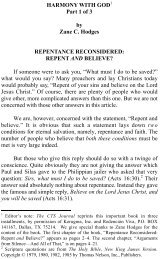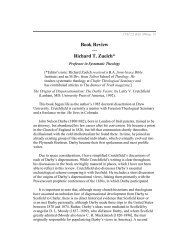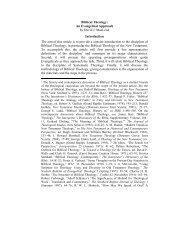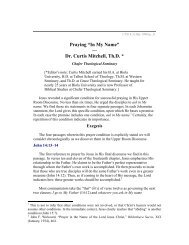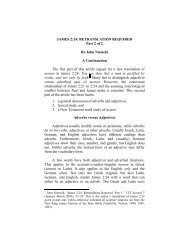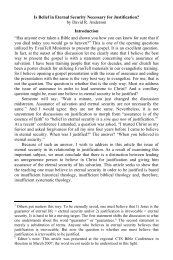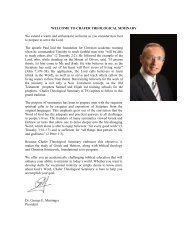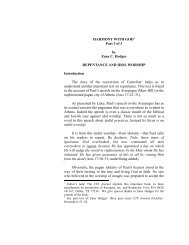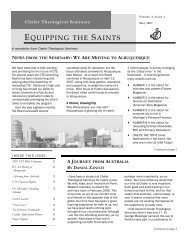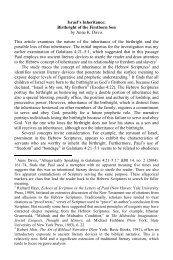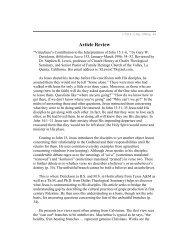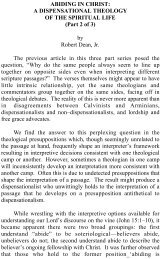Part 5 of 6 - Chafer Theological Seminary
Part 5 of 6 - Chafer Theological Seminary
Part 5 of 6 - Chafer Theological Seminary
You also want an ePaper? Increase the reach of your titles
YUMPU automatically turns print PDFs into web optimized ePapers that Google loves.
36 CTS Journal, vol. 6, #2 (April–June 2000)<br />
the literal nature <strong>of</strong> the one thousand years. Although Revelation<br />
20 is the only passage <strong>of</strong> Scripture specifying the Millennium’s<br />
length, it is not foundational for the Dispensationalist’s belief in<br />
the Messianic Age. 2 Two foundations exist.<br />
The first foundation consists <strong>of</strong> the numerous Old Testament<br />
prophecies <strong>of</strong> the Messiah coming to reign on David’s throne<br />
over a peaceful kingdom. A literal interpretation <strong>of</strong> the many Old<br />
Testament passages concerning the Messianic Kingdom leads to<br />
Dispensational Premillennialism. Israel, in the period <strong>of</strong> the<br />
Messianic Kingdom, is a major theme <strong>of</strong> the Old Testament<br />
prophets and the high point <strong>of</strong> their prophecy. 3 To spiritualize and<br />
allegorize away huge portions <strong>of</strong> Scripture confuses the whole<br />
science <strong>of</strong> interpretation. No more justification exists for<br />
spiritualizing any <strong>of</strong> these prophecies than for doing so to those<br />
prophecies dealing with Christ’s first coming: the virgin birth,<br />
that it would be in Bethlehem, His death, or His physical<br />
resurrection.<br />
The second foundation for the belief in a coming kingdom<br />
rests on the unfulfilled provisions <strong>of</strong> the four unconditional<br />
covenants God made with Israel. If taken literally, these<br />
covenants not only rely solely on God for their fulfillment, but<br />
also require fulfillment within the framework <strong>of</strong> a Messianic Age<br />
or a Millennial Kingdom. Extensive prophetic writings as well as<br />
the unfulfilled portions <strong>of</strong> the unconditional covenants form the<br />
foundation for the Dispensationalist’s belief in the future<br />
Messianic Kingdom. Ultimately, each <strong>of</strong> the four primary facets<br />
<strong>of</strong> Israel’s final restoration (Regeneration, Regathering,<br />
2 Revelation’s only distinct contribution (to the knowledge <strong>of</strong> the kingdom) is<br />
that it specifies that the Messianic Kingdom will last one thousand years. The<br />
term “Millennium” means one thousand years. Thus, the term Millennium<br />
comes from Revelation 20, not the Old Testament. However, the basis for the<br />
Messianic Kingdom is the Old Testament, not Revelation 20.<br />
3 Every writing prophet (other than Jonah, Nahum, Habakkuk, and Malachi)<br />
had something to say about it.



